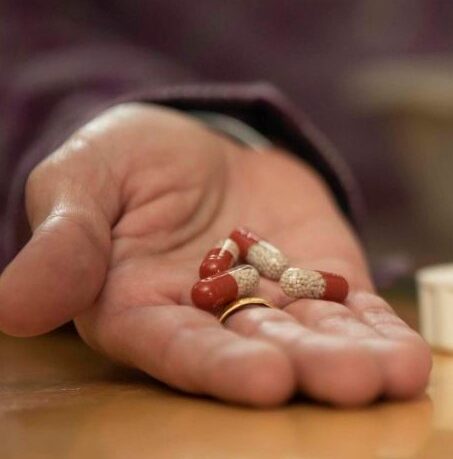Shockingly, half of people with pancreatic cancer are never prescribed PERT – even though it’s readily available on prescription.


Transform lives: Prescribe
Let's make sure people get the prescription they need to stop them from starving.
When cancer attacks the pancreas, it prevents it from breaking down food. The body literally begins to starve – unless the right treatment is given. Simple tablets called Pancreatic Enzyme Replacement Therapy (PERT) can change that. PERT is also known by the brand names Creon®, Nutrizym® and Pancrex®.


Pancreatic cancer reduces the number of enzymes the pancreas makes to break down food. PERT replaces those enzymes so food can be digested again, reducing debilitating symptoms and preventing extreme weight loss.
It’s unacceptable that people with pancreatic cancer don’t have access to the prescription that can stop this starvation.
That’s why we launched our Transform lives: Prescribe campaign.
We’re calling on the NHS to prescribe what people with pancreatic cancer urgently need to live the time they have left to the fullest.
What have we achieved so far?
- Almost 30,000 people signed our open letters to the NHS across the UK, making our voices impossible to ignore.
- We secured a meeting with the National Clinical Director for Cancer at NHS England, Peter Johnson, who agreed to disseminate information about PERT within the NHS.
- We discussed PERT over 51 parliamentarians through our events in Pancreatic Cancer Awareness Month.
- PERT was debated in the House of Lords.
- In Scotland the NHS has given the go-ahead for a specific plan, or ‘pathway’, to support people with pancreatic cancer from diagnosis through to treatment and care. Thanks to our campaign, PERT is going to be a key part of this pathway!
- We launched a PERT hub for health professionals that has been accessed thousands of times.
- Over 2,000 health professionals have downloaded our PERT guide to help them make sure every patient they see who could benefit from PERT gets access. And almost 400 have completed our online training.
- Over £65,000 has been raised so we can continue our vital work to transform the future for everyone with pancreatic cancer.
Our lives were turned upside down. All of the normal things you do as a family, cooking together, eating out together, celebrating Christmas, were all taken away from us because she couldn't eat. Our family life was destroyed.
If people have diabetes, they are prescribed insulin when their pancreas doesn’t produce enough of it. Similarly, people with pancreatic cancer must be prescribed enzymes when their pancreas can’t produce those.
PERT helps build strength to have treatment and potentially gives people more – and better quality – time with their loved ones. Costing the NHS only £7 per day for a prescription, it’s a low-cost solution with life-changing benefits.
As it stands, people who’ve had surgery and have a greater chance of survival are twice as likely to be prescribed it than people whose pancreatic cancer is too advanced to operate on. People with poorer odds should not be written off. Especially when 80% of people with pancreatic cancer are inoperable.
What’s next for the campaign?
Through our events during Pancreatic Cancer Awareness Month 2022 we gained dozens of new supporters in parliaments across the UK. In the New Year we took these MPs and other local politicians up on their promises, making sure that none of our momentum was lost.
Following a year of campaigning we’re now reviewing the successes of our campaign and thinking about what’s next.
If you or loved on is affected by pancreatic cancer, you can support our campaign review. Please share our PERT patient survey to help us to track how far we’ve come over the last year.
Thank you again to all of you who have supported the campaign so far and helped us achieve so much!
Three ways we’re calling on the NHS to make sure everyone who needs this essential prescription is offered it.
Find out more in our full campaign report.
1. The NHS across all four nations should implement national targets to make sure people with pancreatic cancer are prescribed PERT
- We’re calling on NHS England, NHS Wales and the Health and Social Care Board in Northern Ireland to monitor and enforce the existing NICE Quality standard that states that adults with inoperable pancreatic cancer should be prescribed PERT.
- We’re calling on NHS Scotland to implement a Quality Performance Indicator that monitors the compliance of PERT prescription for pancreatic cancer
2. Local health bodies should take action to ensure the effective prescription of PERT
We’re calling on health bodies to:
- Audit their services in line with the national guidelines and ensure they are prescribing PERT to all pancreatic cancer patients who need it.
- Highlight the national guidance on pancreatic cancer and share and promote Pancreatic Cancer UK tools and resources to improve PERT prescription
- Integrate PERT into the pancreatic cancer care pathway from the point of diagnosis, as a central component of care
3. Healthcare professionals should consider PERT for people with pancreatic cancer as standard, at the point of diagnosis
- Every health professional involved with the care of people with pancreatic cancer needs to be aware of PERT.
- All health professionals involved with the initial pancreatic cancer diagnosis need to proactively prescribe PERT to all patients who could benefit from it.
- Healthcare professionals can help by accessing and sharing our online PERT Hub with training and resources on PERT.
Do you have problems digesting your food?
Pancreatic cancer and surgery to remove the cancer can cause problems with digestion. You might get symptoms such as weight loss, runny poo or tummy pain. If you have these symptoms you may need to take PERT.
Our information about PERT explains how it can help. It will also support you to ask your doctor, nurse or dietitian about PERT.


Are you a healthcare professional?
Head over to our new PERT Hub for training and resources on pancreatic cancer and PERT, featuring our new online course endorsed by the British Dietetic Association.






